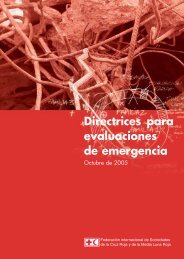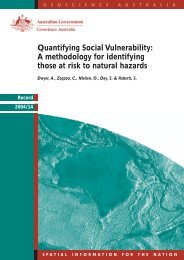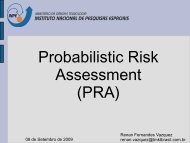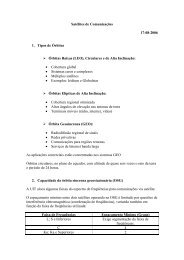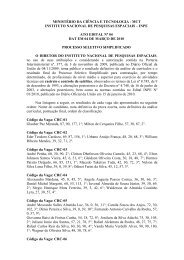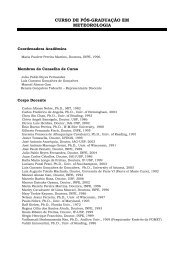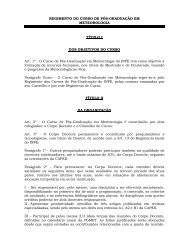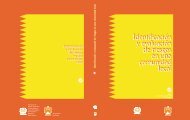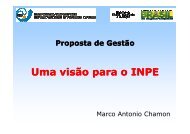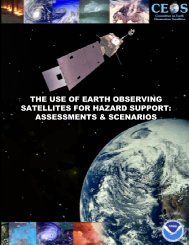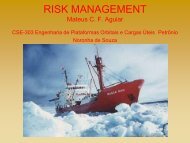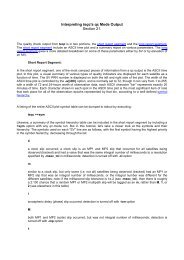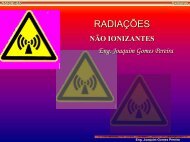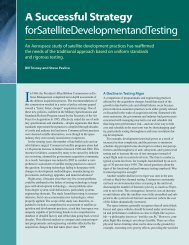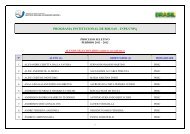Living with Risk. A global review of disaster reduction initiatives
Living with Risk. A global review of disaster reduction initiatives
Living with Risk. A global review of disaster reduction initiatives
Create successful ePaper yourself
Turn your PDF publications into a flip-book with our unique Google optimized e-Paper software.
4<br />
<strong>Living</strong> <strong>with</strong> <strong>Risk</strong>: A <strong>global</strong> <strong>review</strong> <strong>of</strong> <strong>disaster</strong> <strong>reduction</strong> <strong>initiatives</strong><br />
184<br />
A comprehensive Inter-American Strategy was<br />
launched in 1999 to reduce the education sector's<br />
vulnerability to hazards by initiative <strong>of</strong> the<br />
Unit for Sustainable Development and Environment<br />
<strong>of</strong> the Organization <strong>of</strong> American<br />
States (USDE/OAS), working <strong>with</strong> PAHO<br />
and ISDR. Known as EDUPLANhemisferico,<br />
the program seeks to engage public and<br />
private institutions, national and international<br />
agencies, NGOs and private individuals to<br />
encourage member states to adopt the Action<br />
Plan for Reducing the Vulnerability <strong>of</strong> the<br />
Education Sector to Disasters through a variety<br />
<strong>of</strong> international forums. With a Technical<br />
Secretariat for General Coordination located at<br />
Peru's National University at Trujillo, EDU-<br />
PLAN works through eight technical focal<br />
points located in Argentina, Costa Rica,<br />
Trinidad and Tobago, the United States, and<br />
Venezuela to conduct activities at a number <strong>of</strong><br />
local, national and regional locations. Work is<br />
divided into three areas: academic improvement,<br />
citizen participation, and physical infrastructure<br />
protection. There is a commitment to<br />
improve the curriculum <strong>with</strong> the addition <strong>of</strong><br />
more elements pertaining to risk <strong>reduction</strong> in<br />
primary, secondary and higher education so<br />
that individuals and groups <strong>of</strong> various pr<strong>of</strong>essional<br />
interests are prepared to work together<br />
for <strong>disaster</strong> <strong>reduction</strong>.<br />
In another sector in Latin America, progress in<br />
risk management in the public health services<br />
would not have been possible <strong>with</strong>out building<br />
additional pr<strong>of</strong>essional capacities. Independent<br />
consultants and local pr<strong>of</strong>essionals have agreed<br />
that a low-cost, culturally sensitive strategy is<br />
the most effective way to contribute to the<br />
LÍDERES is a vulnerability <strong>reduction</strong> course in Spanish<br />
organized by PAHO/WHO taught almost exclusively by<br />
national specialists <strong>with</strong> international reputations <strong>with</strong> the aim<br />
<strong>of</strong> strengthening the managerial skills required by <strong>disaster</strong> risk<br />
<strong>reduction</strong> practitioners. The content <strong>of</strong> the LÍDERES course<br />
is constantly evolving and is revised in response to the needs<br />
<strong>of</strong> its target audience, the Latin American <strong>disaster</strong> <strong>reduction</strong><br />
community.<br />
A multi-sectoral course programme sponsored by<br />
OFDA/USAID in partnership <strong>with</strong> national governments<br />
and NGOs has a key advantage that Latin American and<br />
Caribbean agencies can hire pr<strong>of</strong>essionals from neighbouring<br />
countries and benefit from their knowledge about local contexts<br />
and cultures, in addition to their local language abilities.<br />
<strong>reduction</strong> <strong>of</strong> risk. All ministries <strong>of</strong> health in<br />
Latin America and the Caribbean now employ<br />
at least one <strong>of</strong>ficial who is in charge <strong>of</strong> <strong>disaster</strong>s.<br />
In many countries there is an entire<br />
department or agency devoted to the subject.<br />
In Argentina, Bolivia, and Chile, new water<br />
and sewage concessions demand that participating<br />
private sector companies meet <strong>disaster</strong><br />
<strong>reduction</strong> criteria in the construction, operation,<br />
and maintenance <strong>of</strong> water and sanitation<br />
systems. Vulnerability studies have been carried<br />
out in Brazil, Chile, Costa Rica, Ecuador,<br />
Peru, and Venezuela to examine water supply<br />
and sewage systems. This has led to an<br />
increased availability <strong>of</strong> current technical information<br />
and a growing demand for training in<br />
<strong>disaster</strong> <strong>reduction</strong> in this field.<br />
LA RED has developed a methodology for<br />
training <strong>of</strong> local authorities in risk management.<br />
It has elaborated training modules and<br />
support material, <strong>with</strong> important conceptual<br />
contributions in the area <strong>of</strong> vulnerability <strong>reduction</strong><br />
and risk management. This methodology<br />
is currently being applied in many countries in<br />
the region and adapted to local conditions.<br />
Africa<br />
As current risk <strong>reduction</strong> efforts in South<br />
Africa require a considerable amount <strong>of</strong> intersectoral<br />
collaboration, a Training and Capacity<br />
Building Working Group has been established<br />
<strong>with</strong>in the national Inter-departmental Disaster<br />
Management Committee to form one body<br />
that can monitor <strong>disaster</strong> management training<br />
and research throughout the country. The<br />
working group is compiling a comprehensive<br />
framework for all types <strong>of</strong> formal and non-formal<br />
<strong>disaster</strong> management training and other<br />
capacity building programs. It is also in the<br />
process <strong>of</strong> establishing a body to set standards<br />
for <strong>disaster</strong> management training consistent<br />
<strong>with</strong> the accreditation requirements <strong>of</strong> the<br />
National Qualifications Framework and the<br />
South African Qualifications Authority.<br />
Schools for community outreach play a vital<br />
role in the community. A proper education<br />
through the schools not only teaches the children<br />
but also reaches deep into the community<br />
through the parents and teachers. It is<br />
observed from past experience that the basic<br />
problems related to <strong>disaster</strong> mitigation and



